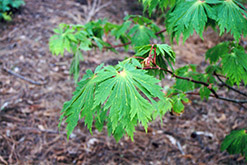Height: 20 feet
Spread: 20 feet
Sunlight:
![]()
Hardiness Zone: 6a
Description:
A shapely, neat and tidy small accent tree, the ideal size for the home landscape, interesting in all seasons with delicately-shaped foliage, blazing fall colors and colorful stems
Ornamental Features
Fullmoon Maple is primarily valued in the landscape for its ornamental globe-shaped form. It has rich green deciduous foliage. The lobed palmate leaves turn outstanding shades of yellow and red in the fall.
Landscape Attributes
Fullmoon Maple is an open multi-stemmed deciduous tree with a more or less rounded form. Its relatively fine texture sets it apart from other landscape plants with less refined foliage.
This tree will require occasional maintenance and upkeep, and should only be pruned in summer after the leaves have fully developed, as it may 'bleed' sap if pruned in late winter or early spring. It has no significant negative characteristics.
Fullmoon Maple is recommended for the following landscape applications;
- Accent
- Mass Planting
- General Garden Use
Planting & Growing
Fullmoon Maple will grow to be about 20 feet tall at maturity, with a spread of 20 feet. It has a low canopy with a typical clearance of 3 feet from the ground, and is suitable for planting under power lines. It grows at a slow rate, and under ideal conditions can be expected to live to a ripe old age of 100 years or more; think of this as a heritage tree for future generations!
This tree should only be grown in full sunlight, although you may want to keep it away from hot, dry locations that receive direct afternoon sun or which get reflected sunlight, such as against the south side of a white wall. It prefers to grow in average to moist conditions, and shouldn't be allowed to dry out. It is not particular as to soil type or pH. It is quite intolerant of urban pollution, therefore inner city or urban streetside plantings are best avoided, and will benefit from being planted in a relatively sheltered location. Consider applying a thick mulch around the root zone in winter to protect it in exposed locations or colder microclimates. This species is not originally from North America.
Disclaimer - This resource is provided for informational purposes only and does NOT reflect current availability. Inventory varies seasonally, so we cannot guarantee that every plant will be in stock at all times - please contact your favourite GardenWorks location directly for current availability. It does not include our entire inventory of plants, so be sure to visit GardenWorks to see varieties that may not be represented on this list.

